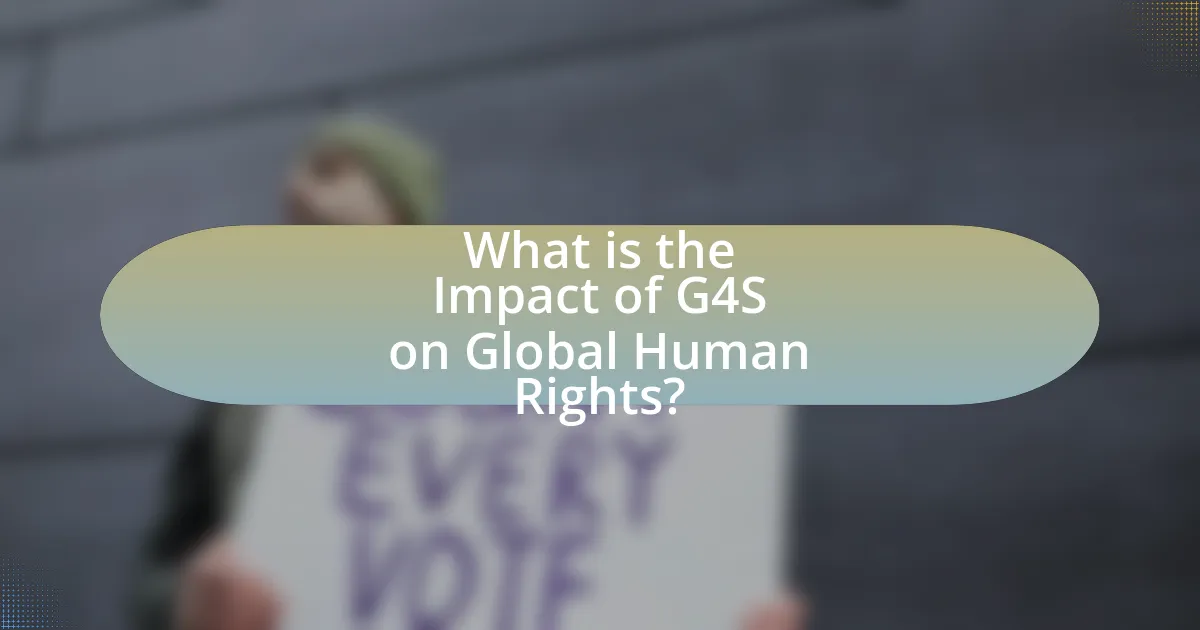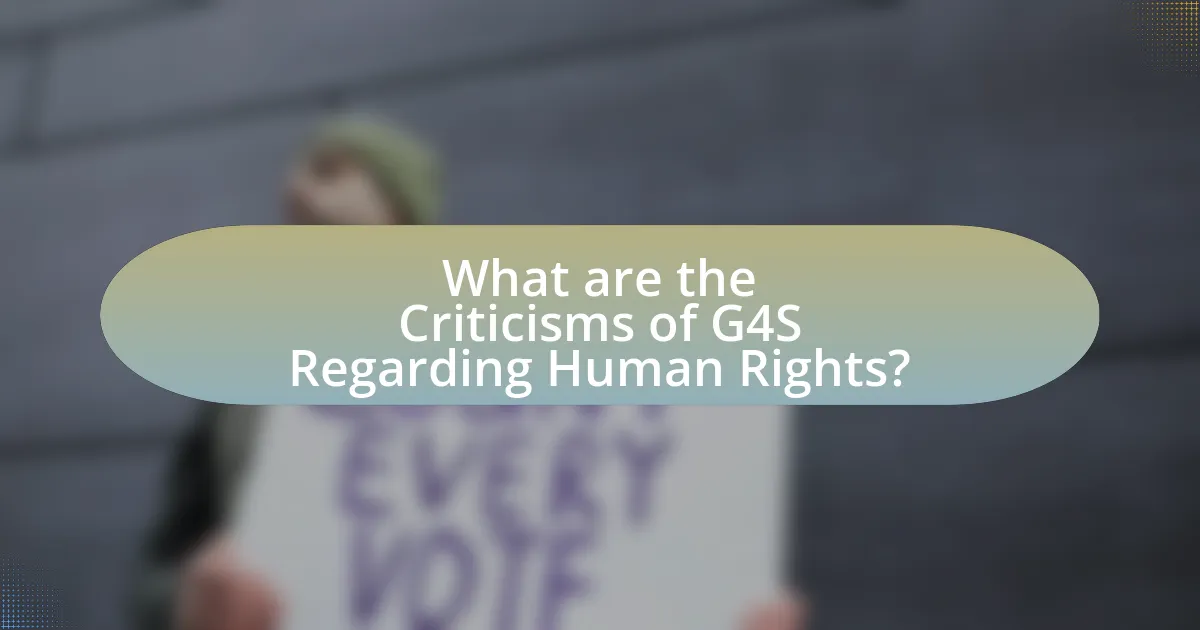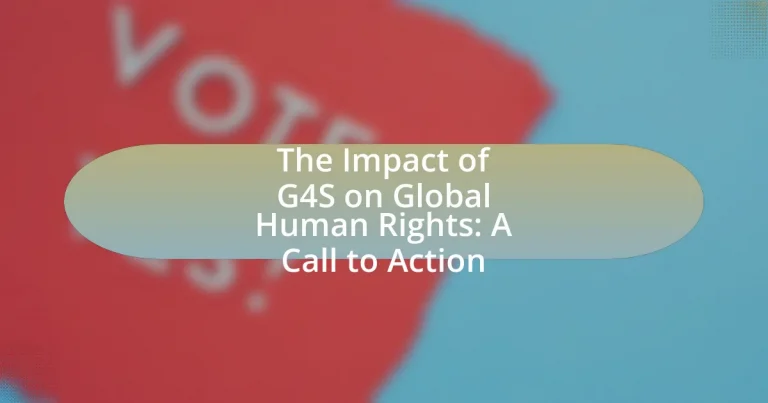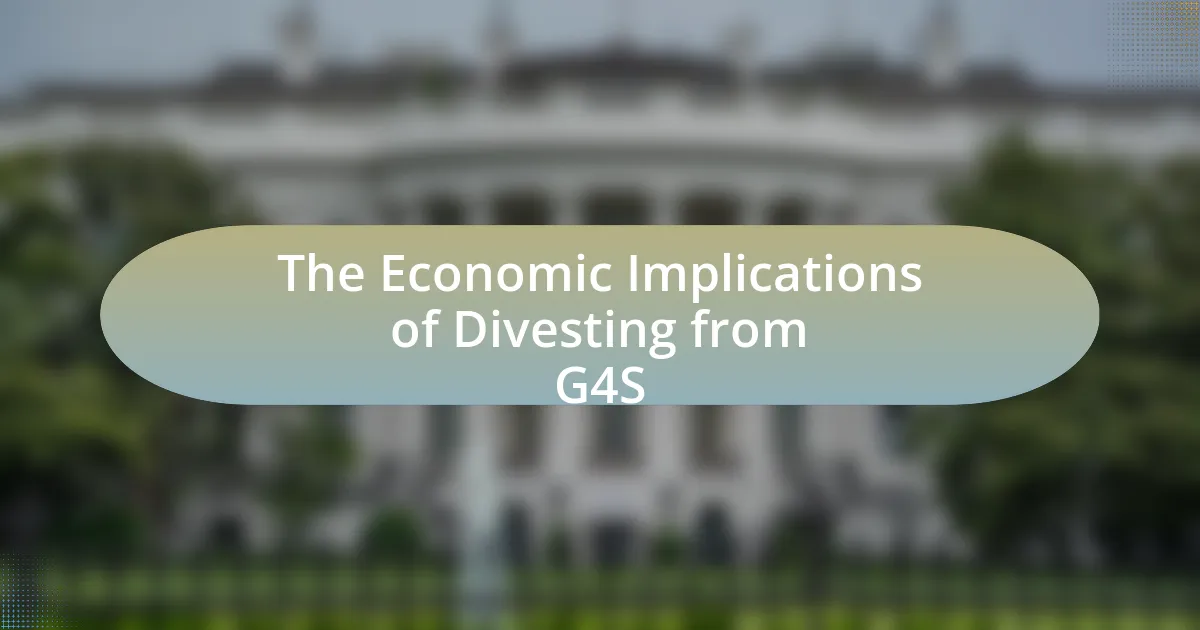G4S, a major private security contractor, significantly impacts global human rights through its operations, which have been linked to various human rights violations, including excessive use of force and mistreatment of detainees. The article examines G4S’s influence on human rights practices worldwide, highlighting specific issues associated with its operations, such as complicity in abuses in conflict zones and inadequate conditions in detention facilities. It also discusses the perceptions of stakeholders regarding G4S’s impact, the criticisms faced by the company, and the implications of its actions for global human rights standards. Furthermore, the article outlines potential actions to address G4S’s human rights impact, the role of governments in regulation, and strategies for promoting accountability and ethical practices within the security industry.

What is the Impact of G4S on Global Human Rights?
G4S has a significant impact on global human rights, primarily through its involvement in security services that have been linked to human rights violations. The company has faced allegations of complicity in abuses, such as excessive use of force, mistreatment of detainees, and inadequate oversight in various countries. For instance, reports from organizations like Amnesty International and Human Rights Watch have documented instances where G4S personnel were involved in incidents that undermined the rights of individuals, particularly in contexts like immigration detention and prison management. These documented cases illustrate the broader implications of G4S’s operations on the protection and promotion of human rights globally.
How does G4S influence human rights practices worldwide?
G4S influences human rights practices worldwide primarily through its role as a major private security contractor, which impacts the enforcement of laws and policies in various countries. The company’s operations often intersect with law enforcement and immigration control, leading to concerns about the treatment of individuals in custody and the use of force. For instance, G4S has faced criticism for its involvement in detention centers, where reports have highlighted instances of abuse and inadequate conditions, raising questions about compliance with international human rights standards. Additionally, G4S’s global presence means that its practices can set precedents for security operations in other regions, thereby shaping the broader landscape of human rights enforcement.
What specific human rights issues are associated with G4S’s operations?
G4S’s operations are associated with several specific human rights issues, including allegations of excessive use of force, inadequate treatment of detainees, and complicity in human rights abuses in conflict zones. Reports from organizations such as Amnesty International and Human Rights Watch have documented instances where G4S personnel have been involved in violent incidents during security operations, raising concerns about the company’s adherence to human rights standards. Additionally, G4S has faced criticism for its role in managing detention facilities, where conditions have been reported as inhumane, violating the rights of individuals in custody. Furthermore, G4S’s contracts in countries with known human rights violations have led to accusations of complicity in abuses, particularly in relation to the treatment of migrants and refugees.
How does G4S’s presence in various countries affect local human rights conditions?
G4S’s presence in various countries often leads to negative impacts on local human rights conditions. In regions where G4S operates, there have been documented instances of human rights abuses, including excessive use of force by security personnel and inadequate treatment of detainees. For example, reports from organizations like Amnesty International highlight cases in which G4S staff were involved in incidents of violence and mistreatment in facilities they managed, such as immigration detention centers. Furthermore, G4S’s contracts with governments in countries with poor human rights records can exacerbate existing issues, as the company may be complicit in state-sponsored abuses. This pattern indicates that G4S’s operations can undermine local human rights standards rather than uphold them.
Why is G4S’s role in human rights significant?
G4S’s role in human rights is significant because it operates in various sectors, including security and prison management, where its practices can directly influence the treatment of individuals. The company has faced scrutiny for its involvement in human rights violations, such as allegations of excessive use of force and inadequate conditions in detention facilities. For instance, reports from organizations like Amnesty International have highlighted instances where G4S’s operations have led to abuses, emphasizing the need for accountability and reform in its practices. This impact on human rights underscores the importance of monitoring and regulating private security firms to ensure they uphold ethical standards and protect individual rights.
What are the implications of G4S’s actions for global human rights standards?
G4S’s actions significantly undermine global human rights standards by perpetuating practices that violate individual rights and freedoms. The company’s involvement in controversial detention centers and security operations has raised concerns about the treatment of vulnerable populations, leading to accusations of complicity in human rights abuses. For instance, reports from organizations like Amnesty International have documented instances of excessive force and inadequate conditions in facilities managed by G4S, highlighting a pattern of neglect for human dignity. These actions not only reflect poorly on G4S but also set a troubling precedent for other security firms, potentially normalizing human rights violations in the industry and eroding global accountability mechanisms.
How do stakeholders perceive G4S’s impact on human rights?
Stakeholders perceive G4S’s impact on human rights as largely negative, citing concerns over human rights violations associated with the company’s operations. Reports from organizations such as Amnesty International and Human Rights Watch have documented instances of excessive use of force, inadequate training of personnel, and complicity in human rights abuses in various countries. These findings have led to calls for greater accountability and transparency from G4S, as stakeholders demand that the company address these serious allegations to improve its human rights record.

What are the Criticisms of G4S Regarding Human Rights?
G4S faces significant criticisms regarding human rights violations, particularly in its management of detention facilities and security operations. Human rights organizations, including Amnesty International and Human Rights Watch, have reported instances of excessive use of force, inadequate medical care, and poor living conditions in facilities operated by G4S. For example, in 2016, a report highlighted the mistreatment of detainees in G4S-run immigration detention centers in the UK, where individuals experienced physical and psychological abuse. Additionally, G4S has been criticized for its role in providing security services in conflict zones, where allegations of complicity in human rights abuses have emerged, such as in Israel and Palestine. These criticisms underscore the ongoing concerns about G4S’s impact on global human rights standards.
What specific allegations have been made against G4S?
G4S has faced specific allegations including involvement in human rights abuses, such as excessive use of force by its security personnel, mistreatment of detainees in immigration facilities, and complicity in torture in conflict zones. Reports from organizations like Amnesty International and Human Rights Watch have documented instances where G4S personnel were accused of using violence against vulnerable populations, particularly in detention centers. Additionally, G4S has been criticized for its role in operating private prisons and providing security services in areas with documented human rights violations, further raising concerns about its compliance with international human rights standards.
How have these allegations been addressed by G4S?
G4S has addressed the allegations by implementing a series of internal reviews and enhancing their compliance and oversight mechanisms. The company has publicly committed to improving training for staff on human rights issues and has engaged with external stakeholders to ensure accountability. Additionally, G4S has established a dedicated human rights policy and reporting framework to monitor and respond to concerns, demonstrating their commitment to addressing these serious allegations effectively.
What are the consequences of these criticisms for G4S’s operations?
The consequences of criticisms for G4S’s operations include reputational damage, increased scrutiny from regulators, and potential loss of contracts. Reputational damage arises from public backlash against the company’s involvement in human rights violations, which can lead to decreased trust among clients and stakeholders. Increased scrutiny from regulators may result in more stringent oversight and compliance requirements, impacting operational efficiency. Additionally, potential loss of contracts, particularly with government entities and organizations prioritizing ethical standards, can significantly affect G4S’s revenue and market position. These factors collectively challenge G4S’s ability to maintain its operational effectiveness and long-term sustainability in a competitive landscape.
How do G4S’s practices compare to industry standards?
G4S’s practices often fall short of industry standards, particularly in areas related to human rights and ethical conduct. Reports from organizations such as Amnesty International and Human Rights Watch have highlighted instances of human rights violations linked to G4S operations, including allegations of excessive use of force and inadequate treatment of detainees. These findings indicate that G4S’s adherence to ethical guidelines and human rights frameworks is inconsistent compared to the expectations set by industry standards, which emphasize accountability, transparency, and respect for human rights.
What benchmarks exist for evaluating human rights practices in the security industry?
Benchmarks for evaluating human rights practices in the security industry include the United Nations Guiding Principles on Business and Human Rights, the Voluntary Principles on Security and Human Rights, and the International Code of Conduct for Private Security Service Providers. These frameworks provide standards for companies to assess their impact on human rights, ensuring accountability and promoting ethical practices. For instance, the UN Guiding Principles outline the responsibility of businesses to respect human rights and provide mechanisms for remedy, while the Voluntary Principles emphasize risk assessment and management in security operations.
How does G4S measure up against its competitors in terms of human rights?
G4S has faced significant scrutiny regarding its human rights practices, often ranking lower than its competitors in this area. Reports from organizations such as Amnesty International and Human Rights Watch have highlighted G4S’s involvement in controversial practices, including allegations of human rights abuses in its operations, particularly in conflict zones and detention facilities. In contrast, competitors like Securitas and Allied Universal have implemented more robust human rights policies and transparency measures, which have been positively recognized in various assessments. For instance, Securitas has been noted for its commitment to ethical labor practices and adherence to international human rights standards, which positions it more favorably compared to G4S in terms of human rights compliance.
What Actions Can Be Taken to Address G4S’s Impact on Human Rights?
To address G4S’s impact on human rights, stakeholders can implement several actions, including enhancing transparency in operations, establishing independent oversight mechanisms, and engaging in dialogue with affected communities. Enhancing transparency involves publicly disclosing operational practices and human rights assessments, which can help build accountability. Independent oversight mechanisms, such as third-party audits, can ensure compliance with human rights standards and identify areas for improvement. Engaging in dialogue with affected communities allows G4S to understand the concerns of those impacted by its operations and to develop strategies that mitigate harm. These actions are supported by various human rights frameworks, including the UN Guiding Principles on Business and Human Rights, which emphasize the responsibility of companies to respect human rights and provide remedies for violations.
What role do governments play in regulating G4S’s operations?
Governments play a crucial role in regulating G4S’s operations by establishing legal frameworks and oversight mechanisms that ensure compliance with national and international laws. These regulations often include licensing requirements for security services, adherence to labor laws, and compliance with human rights standards. For instance, in the UK, the Security Industry Authority (SIA) regulates private security companies, including G4S, by enforcing standards for training and conduct. Additionally, governments may conduct audits and investigations into G4S’s practices, particularly in sensitive areas such as immigration detention and prison management, to ensure that human rights are upheld. This regulatory oversight is essential for holding G4S accountable and mitigating potential human rights violations associated with its operations.
How can international laws be strengthened to protect human rights in security services?
International laws can be strengthened to protect human rights in security services by establishing binding regulations that hold private security companies accountable for human rights violations. This can be achieved through the implementation of comprehensive international treaties that define the responsibilities of security service providers, ensuring they adhere to human rights standards similar to those imposed on state actors. For instance, the UN Guiding Principles on Business and Human Rights provide a framework that can be expanded to include specific obligations for security firms, mandating regular human rights impact assessments and transparent reporting mechanisms. Additionally, enhancing collaboration between international organizations, governments, and civil society can facilitate monitoring and enforcement of these laws, as evidenced by the success of initiatives like the International Code of Conduct for Private Security Service Providers, which has garnered support from various stakeholders to promote accountability and ethical practices in the industry.
What are the responsibilities of corporations when partnering with G4S?
Corporations partnering with G4S are responsible for ensuring compliance with human rights standards and ethical practices. This includes conducting thorough due diligence to assess G4S’s operational practices, particularly in areas related to security and human rights, as G4S has faced scrutiny for its involvement in controversial practices globally. Corporations must also implement monitoring mechanisms to evaluate G4S’s adherence to these standards throughout the partnership, ensuring that any potential human rights violations are addressed promptly. Furthermore, corporations should engage in transparent communication with stakeholders about their partnership with G4S, demonstrating accountability and commitment to upholding human rights principles.
What can individuals and organizations do to advocate for human rights in relation to G4S?
Individuals and organizations can advocate for human rights in relation to G4S by raising awareness of the company’s practices and their implications on human rights. They can conduct research and publish reports detailing G4S’s involvement in controversial activities, such as immigration detention and security operations in conflict zones, which have raised ethical concerns. For instance, reports from organizations like Amnesty International and Human Rights Watch have documented instances where G4S’s operations have allegedly contributed to human rights violations. Additionally, individuals and organizations can engage in campaigns that pressure governments and institutions to reconsider contracts with G4S, emphasizing the need for ethical standards in security services. Mobilizing public opinion through social media and community outreach can further amplify these efforts, fostering a collective demand for accountability and reform within G4S’s operations.
How can awareness campaigns influence G4S’s practices?
Awareness campaigns can significantly influence G4S’s practices by increasing public scrutiny and accountability regarding its operations. When awareness campaigns highlight issues such as human rights violations or unethical practices, they can lead to public pressure, prompting G4S to adopt more responsible policies and practices. For instance, campaigns that draw attention to G4S’s involvement in controversial activities, such as immigration detention or security operations in conflict zones, can result in negative publicity and consumer backlash, which may compel the company to reassess its strategies and improve compliance with human rights standards. This dynamic is supported by historical instances where public outcry has led corporations to change their practices in response to heightened awareness and advocacy efforts.
What are effective strategies for holding G4S accountable?
Effective strategies for holding G4S accountable include implementing rigorous oversight mechanisms, engaging in public advocacy, and fostering transparency through independent audits. Oversight mechanisms, such as regular evaluations by human rights organizations, can ensure compliance with international standards. Public advocacy campaigns can mobilize community support and pressure G4S to adhere to ethical practices. Additionally, independent audits conducted by third-party entities can provide objective assessments of G4S’s operations, revealing any human rights violations and holding the company accountable for its actions. These strategies collectively enhance accountability and promote adherence to human rights standards.
What are the best practices for promoting human rights in the security industry?
The best practices for promoting human rights in the security industry include implementing comprehensive human rights training for all personnel, establishing clear policies that prioritize human rights, and ensuring accountability through independent oversight. Comprehensive training equips security personnel with the knowledge to recognize and respect human rights, while clear policies provide a framework for ethical conduct. Independent oversight, such as regular audits and reporting mechanisms, ensures that security practices align with human rights standards, as evidenced by the UN Guiding Principles on Business and Human Rights, which emphasize the responsibility of companies to respect human rights in their operations.
How can security companies implement human rights training for their staff?
Security companies can implement human rights training for their staff by developing comprehensive training programs that incorporate international human rights standards and local laws. These programs should include modules on the Universal Declaration of Human Rights and relevant legal frameworks, ensuring that employees understand their responsibilities in upholding these rights.
Additionally, security companies can engage with human rights organizations to provide expert-led workshops and real-world case studies that illustrate the importance of human rights in security operations. Regular assessments and feedback mechanisms should be established to evaluate the effectiveness of the training and make necessary adjustments.
Evidence shows that companies that prioritize human rights training not only enhance their reputation but also reduce the risk of legal liabilities and improve employee morale, as highlighted in the 2020 report by the Business and Human Rights Resource Centre, which emphasizes the correlation between human rights training and operational effectiveness in security contexts.
What frameworks exist for ensuring accountability in security operations?
Several frameworks exist for ensuring accountability in security operations, including the United Nations Guiding Principles on Business and Human Rights (UNGPs), the International Organization for Standardization (ISO) standards, and the Voluntary Principles on Security and Human Rights. The UNGPs provide a comprehensive framework that outlines the responsibilities of businesses to respect human rights and establish grievance mechanisms. ISO standards, such as ISO 31000 for risk management, help organizations implement effective accountability measures. The Voluntary Principles offer guidance for security and human rights practices, emphasizing the need for transparency and accountability in security operations. These frameworks collectively promote responsible conduct and accountability in the security sector, particularly relevant to organizations like G4S, which operate globally and impact human rights.





